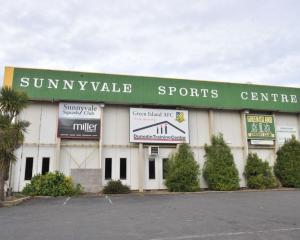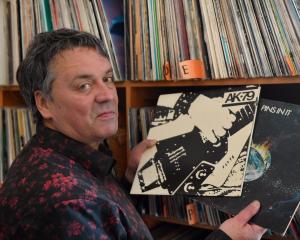Dunedin City Council parking enforcement bosses might be used to dealing with angry customers, but they probably were not expecting a councillor to compare their new footpath policy proposals with rules enforced in the communist days of former East Germany.
But that was what development services manager Kevin Thompson and parking services team leader Daphne Griffen got when they turned up to a planning and environment committee this week.
Councillors Richard Thomson and Jinty MacTavish led objections to the pair's commercial-use-of-footpaths policy review.
The reviewed policy includes a ban on commercial footpath advertising in Dunedin, whether simple chalk messages or a recently employed stencil-and-waterblaster method.
Following what Ms Griffen said was a "significant increase" in signboards, tables, chairs and other objects, the review more clearly defined what those objects were, and where they could not be placed.
Maximum heights for signs were introduced, and banners and flags banned.
Her report said there needed to be some control over the placement of objects on the footpaths to ensure there was a safe and unobstructed passage for pedestrians of all abilities, and to ensure the visual amenity of streetscapes was not detrimentally affected.
Cr MacTavish questioned whether there might be a "slightly less restrictive approach" to the matter, perhaps with guidelines, rather than rules.
She suggested there appeared to be a lot of time and paperwork over trivial matters.
Mr Thompson said the policy was originally brought in because of many complaints the council received from elderly or visually impaired people as the number of objects increased.
Staff had been through "a very difficult time" trying to get compliance, and only recently had achieved that.
Cr MacTavish queried rules such as stipulating "screens must be the same colour as existing street furniture".
Cr Thomson likened the rules to something former East Germany might have enforced.
Included in his concerns was a rule that fees for street furniture should be reviewed annually. He said premises would get a permit for one table and chair, then put out three or four in an area that was unsuitable.
Business needs changed regularly, and if no change was required, the permit merely rolled over until the next year.
At a public forum yesterday, Dunedin company Clean Advertising NZ, which uses stencils and a waterblaster to create temporary advertising images on footpaths, argued it should be allowed to continue to do that.
The company's first contract, after it was set up this year, was with the council to create liquor-ban stencils for the 2011 Rugby World Cup.
The committee voted to put the policy out for consultation, with a submission period ending January 31 next year.












